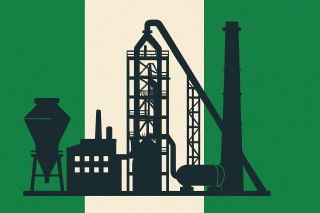India is making a concerted effort to divert more inorganic waste to the cement manufacturing industry as a fuel. Last week, CemNet reported that the Cement Manufacturers Association (CMA) had expressed a commitment to tackle greater disposal of single-use plastics by the cement sector, which could see a reduction of 15-20 per cent of fossil fuel usage by the industry.
Currently, waste fuel in India's cement plants only accounts for approximately 10 per cent of fuel consumption. Out of a total of 238 cement plants in India, 46 plants use plastic waste as a fuel, according to the Times of India. Moreover, official estimates report that out of the 26,000tpd of plastic waste generated across India, only 60 per cent of it is recyclable. "The association of cement manufacturers has assured us that they will take necessary steps to ensure that all cement plants use plastic waste fuel," said Durga Shankar Mishra, urban affairs secretary. "That will help us in a big way to get rid of the garbage that can't be processed."
The Ministry of Housing and Urban Affairs (MoHUA) has approached the cement industry to see how it can increase the dispatches of processed waste to cement plants. Current estimates are that plastic waste needs to be transported up to 200km before reaching a cement plant for co-processing, according to The Hindu.
This week, the CMA in collaboration with MoHUA used the visual symbol of destroying a 10m Ravana effigy, made of plastic waste, to represent that cement plants will start to process single-use plastics in Ravana. At the gathering, Mahendra Singhi, president of the CMA and MD/CEO of Dalmia Cement (Bharat) Ltd, stated: "We are glad to partner with the Government of India in this mammoth social cause of saving planet earth. The cement industry is a critical partner in the government’s goal towards – Samuchit Niptaan – the total disposal of waste and plastics. The entire cement Industry has come together in this noble initiative to fight plastic pollution and make its significant contribution towards environment protection."
The MoHUA and CMA are collectively conducted the plastic waste initiative across five cities in India, including Delhi, Noida, Lucknow, Raipur and Ahmedabad.
Jharkhan cement plant in West Singhbhoum district is one of the first cement plants in India to adopt plastic waste co-processing. The cement producers in Gujarat state are among the leaders for co-processing plastic waste, which makes up five per cent of their total fuels, and it could soon be made mandatory for producers in the state to increase this to 10 per cent of their fuel use. "A few plants have already started setting up some infrastructure so that they can dispose of plastic waste," added Mr Singhi.
While Indian cement producers are well aligned with coal plants and the steel industry for fly ash and slag, much progress has to be made to better equip cement plants with upgrades to burn waste plastics.
Who pays?
Meanwhile, there are several issues up for discussion. These will include who will bear the cost of any investments required and how soon the country can make the switch to burning plastic waste. It is estimated that the capital expenditure required to install the necessary equipment to burn the waste will be between INR150-300m (US$2.1-4.2m) per plant.
"The model implemented in Europe and worldwide is for the polluter to pay," added Mr Singh. "If India implements this scheme, then the producers of single-use plastics will pay to dispose their waste. The cement industry should either get paid or the plastic should at least be free for us."
Meghalaya initiative
However, initial projects have not always been free for the cement plants. In Meghalaya, where around 10 per cent of the country's limestone reserves are found and home to many cement plants, cement companies pay for the plastic waste. One initiative has ragpickers and volunteers collecting plastic waste to be used as fuel in cement plants. To benefit from this service, cement producers have to pay the scrap dealers INR30/kg of plastic as part of the government's "Plastic Challenge" initiative. The scheme enables tribal bodies and local organisations in Meghalaya to play their part in reducing plastic waste in the province, which has had a plastic ban on many items since 2018.
Making green choices profitable
At the recent Climate Action 2019 meeting in New York, USA, Mr Singh said at the UN General Assembly session that, "Industry and the economy must move from grey to green, and we [Dalmia Cement] are fully committed to provide leadership. Our philosophy of clean and green is profitable and sustainable."
Dalmia Cement has committed to 100 per cent replacement of fossil fuels by sustainable biomass and bamboo plants as well as municipal and plastic waste by 2035.
